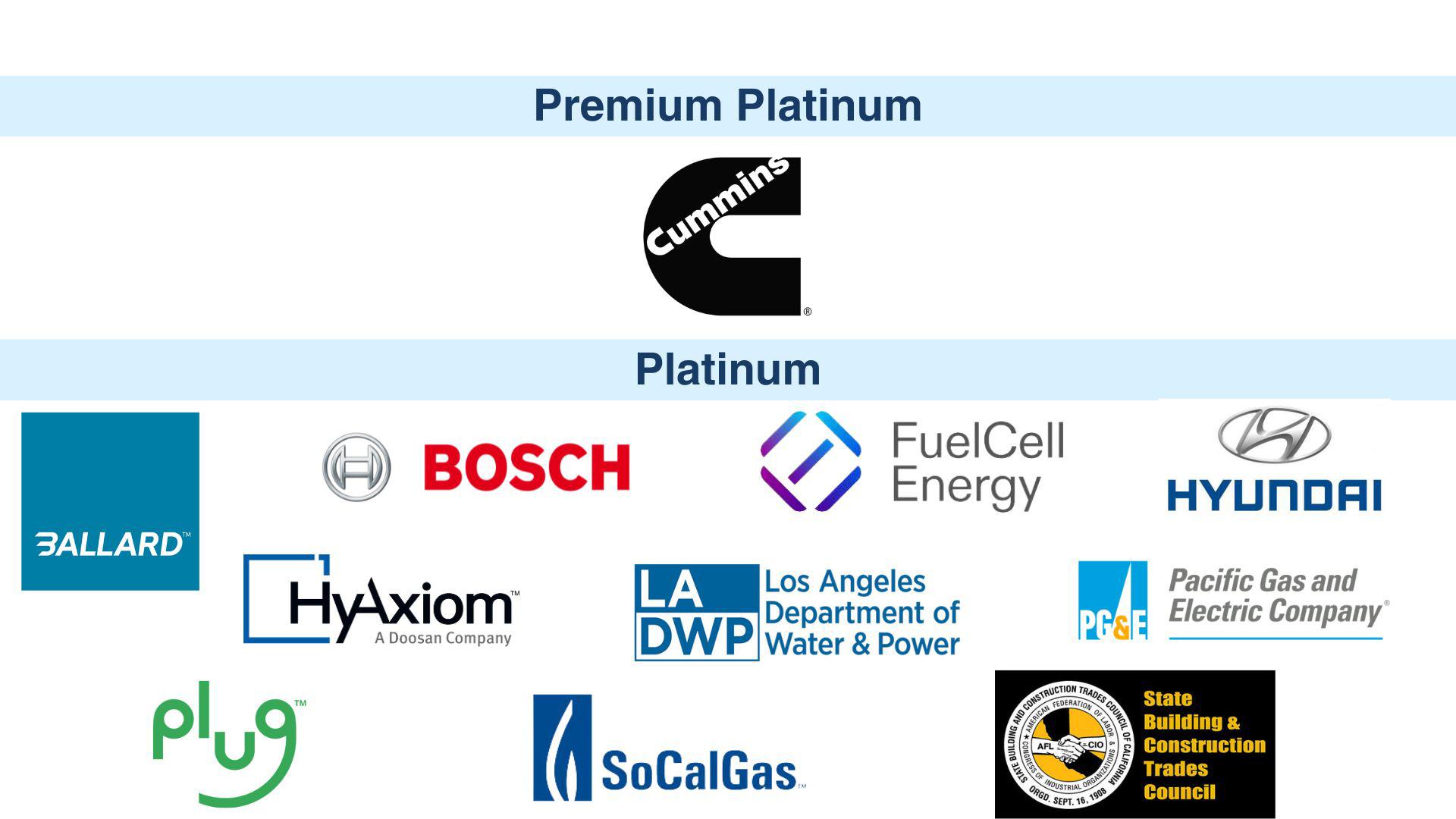Hydrogen Fuel Cell Bus Info Page: The "Better" Electric Bus
Contents
Performance: Fuel Cell Electric Buses Operate the Same Way as Diesel & CNG Buses
Total Cost of Ownership Reports
Hydrogen Fuel Cell Buses Available Today
Resilience: Zero-Emission Emergency Back-Up Power from Fuel Cells
Hydrogen Fuel Cell Bus Announcements
California Air Resources Board Innovative Clean Transit Rule & Rollout Plans
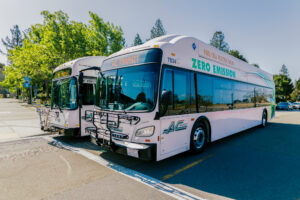
As transit agencies across the country consider the options to decarbonize their fleets, hydrogen fuel cell electric buses (FCEBs) have emerged as a compelling option due to similar operational logistics and performance compared to incumbent technologies. This information sheet serves as a reference point for transit agency decision makers for further information on FCEBs and hydrogen infrastructure implementation.
Transit Agencies overall have had great experiences using fuel cell electric buses in their day-to-day operation. The National Renewable Energy Lab (NREL) has published data on FCEB performance and maintenance over the past 12 years from multiple agencies that can be found here, including the most recent Current Status 2022 report: https://www.nrel.gov/hydrogen/fuel-cell-bus-evaluation.html
Oakland-based AC Transit embarked on the transit industry’s first-ever Zero Emission Transit Bus Technology Analysis (ZETBTA), euphemistically known as the “5-by-5 Study” in 2019. The ZETBTA is a robust side-by-side evaluation of the predominant engine technologies in use at transit agencies worldwide: FCEB, battery electric bus (BEB), diesel hybrid, and conventional diesel bus propulsion systems. In total, the ZETBTA was a four-volume study, completed by Stanford University’s Precourt Institute for Energy. For more information, visit: https://www.actransit.org/zeb#Reports
When it comes to ambient conditions analysis, the following report, An Analysis of the Association between Changes in Ambient Temperature, Fuel Economy, and Vehicle Range for Battery Electric and Fuel Cell Electric Buses, was produced by Cleveland State University, Energy Policy Center at the Levin College of Urban Affairs, the Midwest Hydrogen Center of Excellence, Center for Transportation and the Environment (CTE), and in collaboration with Stark Area Regional Transit Authority (SARTA). In 2020, the same authors published the following: Update of Investigation into Changes in Fuel Economy and Vehicle Range Related to Change in Ambient Temperature for Battery and Fuel Cell Electric Buses.
In a 2020 report by Foothill Transit, in a letter to their Board, the chart below shows the comparative costs between BEBs and FCEBs over 12 years of life.

The chart demonstrates that the cost of operating BEBs on Line 486 is higher than FCEBs over a 12-year period by $12.9 million. The cost differential stems from the higher capital cost of BEB buses due to having to operate more buses to accommodate its limited range capacity. The costs of fueling infrastructure for FCEBs and mid-life maintenance are also lower compared to BEBs.
The AC Transit ZETBTA is a robust side-by-side full cost per mile evaluation of the predominant engine technologies in use at transit agencies worldwide (July 2021-December 2022): FCEB, battery electric bus (BEB), diesel hybrid, and conventional diesel bus propulsion systems. The table below is from Volume 4.

The following graphic depicts the following methods of obtaining hydrogen fuel:
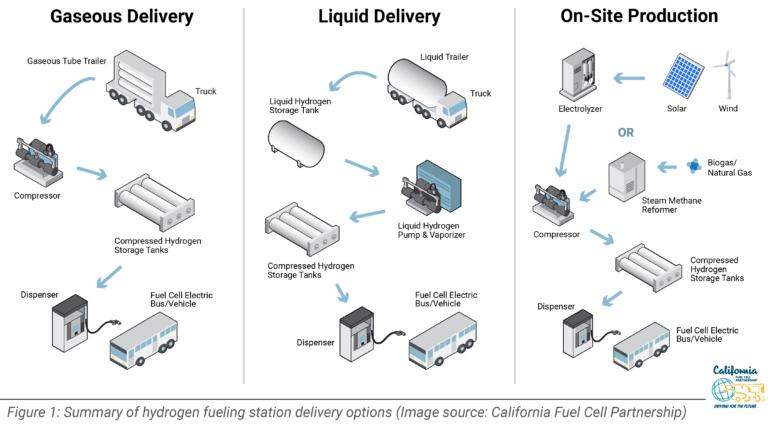
There is a lot to consider when putting in a hydrogen station, including changes to property layout with space considerations (e.g. fire code setback distances). It's best practice to consult with an engineering firm or hydrogen infrastructure company with this experience. Here are links to companies that have set up transit fueling stations: Air Products, Clean Energy Fuels, Trillium Energy, Nel.
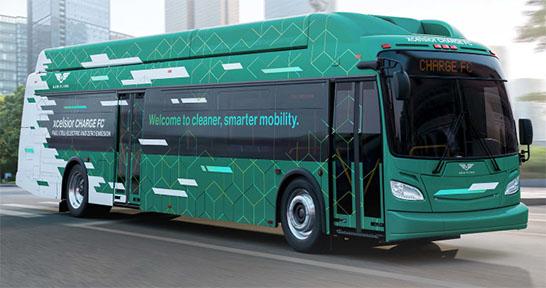
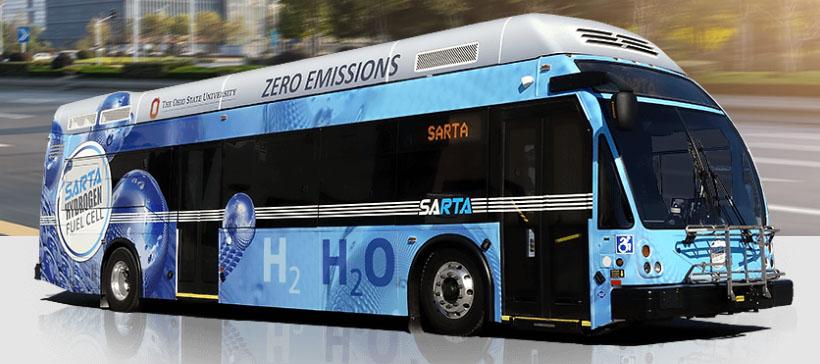
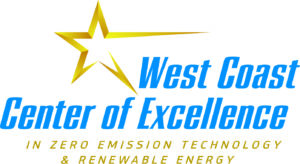
One example of a maintenance training facility is the West Coast Center of Excellence in Zero Emission Technology (CoEZET) is hosted by SunLine Transit Agency in Thousand Palms, CA. This effort is for workforce investments, outreach, knowledge capture, and maintenance training workshops. Funded by the FTA, the Center serves to bring education to transit agencies looking to establish or increase their zero-emission fleets and technologies. Instruction will cover topics that address in-service management of zero-emissions technologies, which includes fueling systems and fleet operations. CoEZET provides a place for focused training and instruction in conjunction with educational institutions and original equipment manufacturers. The Center has also been funded for a dedicated zero-emissions maintenance facility which will be used to demonstrate many of the diagnostic tools necessary to maintain zero-emission fleets. Additional information can be found on this brochure and here.

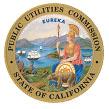
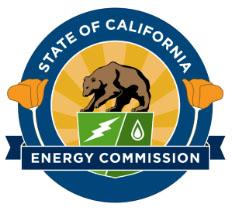


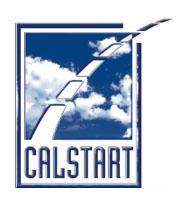

Hydrogen fuel cells are already used for back-up power in critical operations such as hospitals and data centers. Transit agencies also have this option to further utilize hydrogen for back-up power through stationary fuel cells. This allows further use of the readily available hydrogen fuel. Examples of fuel cells used for back-up power can be found this presentation entitled Fuel Cells for Resilience and Decarbonization in California. A fact sheet was created and can be found here with information on fuel cell generators available from different suppliers.
Alameda-Contra Costa Transit District (AC Transit)
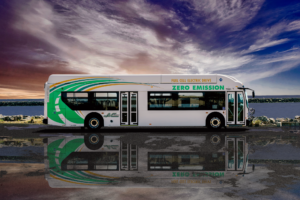
AC Transit’s launched its first hydrogen fueling facility in November 2002, which serviced a single 30-foot fuel cell electric bus (FCEB). In fewer than four years, that sole FCEB had proven successful for the East Bay’s varied topography of hills and flatlands and robust rider demand and allowed the transit district to expand its FCEB to a fleet of three and simultaneously launch its first-generation FCEB pilot program. By 2010, AC Transit had expanded its zero emission fleet to 13 second-generation FCEBs, and in so doing emerged as a global leader in hydrogen fuel cell operations, including penning the industry’s first-ever technician’s manual for mechanical maintenance. AC Transit continued to advance its zero emission technologies by opening a second onsite fueling station in 2014. AC Transit has made such significant strides in FCEB mechanical maintenance that by 2017, its fuel cell power plants surpassed the Department of Energy (DOE) and Federal Transit Administration’s (FTA) targets of 25,000 hours of operation.
“AC Transit is unique, and I am proud to boast we are unprecedented in zero emission technologies,” says General Manager Michael Hursh. “We have now operated hydrogen fuel cells as well as battery electric buses for more than 20 years. Our diverse propulsion systems not only mean we’re helping to clean Bay Area air quality every day but through ‘boots on the ground’ ingenuity, our zero emission technicians revolutionized hydrogen fuel cell maintenance through the first-ever transplant of a hydrogen fuel cell stack. Our ZEB maintenance tech's demonstrated that with an OEM parts kit, we can rehabilitate an FCEB at mid-life and extend the useful life expectancy, not to mention its performance. In fact, this historic achievement is just one of the advancements fueling our evolving in-house zero emission university."
Zero Emission Transit Bus Technology Analysis - Volume 1 (2021)
Zero Emission Transit Bus Technology Analysis - Volume 2 (2021)
Foothill Transit
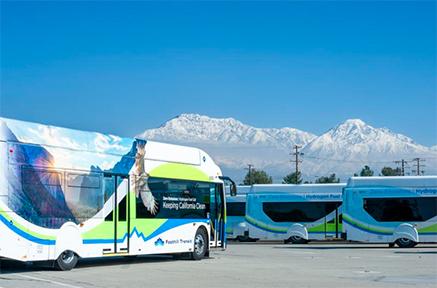
Foothill Transit, a public transportation agency serving the San Gabriel and Pomona Valleys in Los Angeles County, is a longtime leader in deploying clean energy fleets, from the nation’s first heavy duty battery electric buses in 2010 to today’s hydrogen fuel cell (HFC) buses. Foothill Transit introduced 33 HFC buses to its fleet in 2022 -- the largest HFC bus fleet in the nation -- with the goal of achieving a fully zero emissions fleet by 2040.
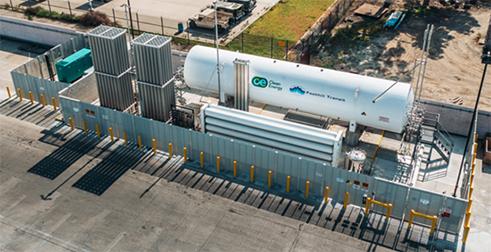
Nineteen more will arrive starting in 2025, and thanks to generous grants from ARCHES and TIRCP, Foothill Transit will add approximately 190 HFC buses and a new hydrogen fueling station in the years to come. HFC deployment has reaped many lessons from the technology's unique benefits, such as extended range and speedy refueling. Foothill Transit’s investment in HFC will continue, thanks to partnerships that support hydrogen production throughout the state, positioning Foothill Transit at the forefront of sustainable public transportation in Southern California.
Orange County Transit Authority (OCTA)
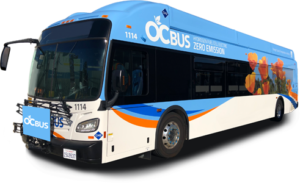
In 2020, OCTA debuted a new hydrogen fueling station, the largest transit-operated hydrogen fueling station in the United States, and introduced 10 hydrogen fuel-cell electric buses. The $22.9 million program follows a pilot program in which OCTA became the first large public transportation agency in Southern California to operate a hydrogen fuel-cell electric bus. As of today, OCTA has the largest hydrogen fueling station in nation for transportation with a hydrogen fuel capacity of 4,800 kilograms and a bus capacity of 40-50 buses, scalable to 100 FCEBs with additional fuel storage and components. For more information, visit: http://www.octa.net/Bus/Hydrogen-Fuel-Cell-Electric-Bus/Overview/
Stark Area Regional Transit Authority (SARTA)
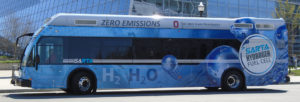
SARTA is committed to utilizing clean fuel buses and looking towards the future of zero-emission transportation. In 2017 SARTA introduced a new alternative method of transportation; the Hydrogen Fuel Cell, to the riders of Stark County. SARTA is currently working towards putting 18 hydrogen fuel buses on the road.
SARTA's Borrow-A-Bus Program: In October, 2018, SARTA CEO, Kirt Conrad, announced the implementation of a one-of-a-kind program that would allow any transit-dependent organization or transit agency the opportunity to borrow one of SARTA’s Zero-Emission Hydrogen Fuel Cell Electric Buses at no initial cost. For more information, visit: https://www.sartaonline.com/sartas-borrow-a-bus-program
SunLine Transit Agency
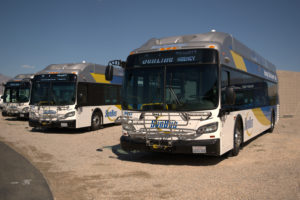
Hear from Sunline Transit's former CEO/General Manager Lauren Skiver in this exposé on their fuel cell electric bus fleet deployment and onsite hydrogen production experience. More information on Sunline's hydrogen FCEB fleet, including a #TransitTuesday Sunline ReFueled webinar recording, go to their Clean Fleet webpage.
AC Transit Launches Zero Emission Bus University
SamTrans set to make largest zero-emission bus purchase in the agency's history
Humboldt Transit Authority Awarded $38.7M Grant for 11 Fuel Cell Electric Buses
NCTD Awarded $29.3 Million for 23 Zero-Emission Bus Transition
Santa Cruz, Calif., Area Buying 57 Hydrogen-Powered Buses
SEPTA Board Approves Purchase of 10 Fuel Cell Buses
RTC to roll out new hydrogen fuel cell electric buses in Washoe County
Regional Transportation Commission adds 8 hydrogen fuel buses to its fleet
California Air Resources Board Innovative Clean Transit Rule & Rollout Plans
The Innovative Clean Transit (ICT) regulation (Cal. Code Regs. Tit. 13 § 2023.1(d)) requires each transit agency to submit a complete Zero-Emission Bus Rollout Plan (Rollout Plan), approved by its governing body, showing how it plans to achieve a full transition to zero-emission buses (ZEBs).
The Southern California Association of Governments, through their "Toolbox Tuesday" webinar series put on the following webinars on hydrogen including Hydrogen and Workforce Development.
The CHBC and CTA partnered in 2019 to conduct a 4-part webinar series on hydrogen fuel cell electric buses:
